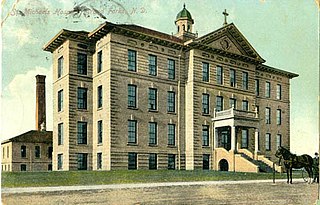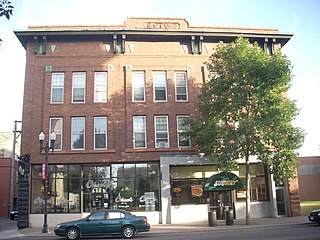
Fargo Station is a train station in Fargo, North Dakota, United States. It is served by Amtrak's Empire Builder. It is the only railway station in use in the Fargo-Moorhead area and is the third-busiest in North Dakota. The platform, tracks, and station are currently all owned by BNSF Railway. The station is currently located in the former BNSF freight house. The former main station building is now home to Great Northern Bicycle Co.

There are nine historic districts in Meridian, Mississippi. Each of these districts is listed on the National Register of Historic Places. One district, Meridian Downtown Historic District, is a combination of two older districts, Meridian Urban Center Historic District and Union Station Historic District. Many architectural styles are present in the districts, most from the late 19th century and early 20th century, including Queen Anne, Colonial Revival, Italianate, Art Deco, Late Victorian, and Bungalow.

The Greenwich Avenue Historic District is a historic district representing the commercial and civic historical development of the downtown area of the town of Greenwich, Connecticut. The district was listed on the National Register of Historic Places on August 31, 1989. Included in the district is the Greenwich Municipal Center Historic District, which was listed on the National Register the year before for the classical revival style municipal buildings in the core of Downtown. Most of the commercial buildings in the district fall into three broad styles, reflecting the period in which they were built: Italianate, Georgian Revival, and Commercial style. The district is linear and runs north–south along the entire length of Greenwich Avenue, the main thoroughfare of Downtown Greenwich, between U.S. Route 1 and the New Haven Line railroad tracks.

Cass County Court House, Jail, and Sheriff's House is a property in Fargo, North Dakota that was listed on the National Register of Historic Places in 1983.

deLendrecie's Department Store was a department store located in Fargo, North Dakota.

The Fargo station is a former railway station in Fargo, North Dakota. Built in 1898, it was listed on the National Register of Historic Places in 1975 as the Northern Pacific Railway Depot.
Fargo South Residential District is a 82.3-acre (33.3 ha) historic district in Fargo, North Dakota that was listed on the National Register of Historic Places in 1983.

North Dakota State University District is a 36-acre (15 ha) historic district on the campus of North Dakota State University, in Fargo, North Dakota, that was listed on the National Register of Historic Places in 1986.

Wright Block is a property in Grand Forks, North Dakota that was listed on the National Register of Historic Places in 1982.

George Hancock was an architect active in North Dakota, Montana and Minnesota.

The Telephone Co. Building in Grand Forks, North Dakota, United States, was built in 1904. It was listed on the National Register of Historic Places in 1982.

The Stratford Building is a property in Grand Forks, North Dakota that was listed on the National Register of Historic Places in 1982.

The University of North Dakota Historic District is a 127-acre (51 ha) area in Grand Forks, North Dakota that was listed as a historic district in the National Register of Historic Places on January 13, 2010.
The building at 205 DeMers Ave. is a property in Grand Forks, North Dakota that was listed on the National Register of Historic Places in 1982. It was destroyed by the 1997 Red River flood, and was officially delisted in 2018.

The First National Bank is a five-story building in Grand Forks, North Dakota, that was built in 1914–15 and listed on the National Register of Historic Places in 1982. It was built for the Scandinavian-American Bank, but has been identified as the First National Bank building since 1929.

The Grand Forks Riverside Neighborhood Historic District is a 112-acre (45 ha) historic district in Grand Forks, North Dakota that was listed on the National Register of Historic Places in 2007.

William Colston Albrant was an American architect practicing in Fargo, North Dakota.

The North Side Fargo Builder's Residential Historic District is a 25.4-acre (10.3 ha) historic district with 103 contributing buildings located eight blocks north of downtown Fargo, North Dakota. The district's name derives from the fact that the plans for the houses came from popular builder's pattern books. The homes were built in the late 1920s and 1930s. Tudor Revival is the predominant style, though Colonial Revival and American Foursquare architecture is also present. The district was listed on the National Register of Historic Places in 1987.

The Black Building at 114-118 Broadway in Fargo, North Dakota was a "pivotal" historic resource in the Downtown Fargo District, in the listing of that historic district upon the National Register of Historic Places. In 2016 it was also individually listed on the National Register, as its "owners chose to pursue the honor of individual listing for its architecture and for its association with George Mumford Black and his strategies in commerce and communications. Black had the upper floor of the Art Moderne building designed for WDAY (AM) radio and ensured the station signed off each show with “this is WDAY with from the Black Building, Fargo” and he is credited with creating the one-cent sale."

The Federal Building and U.S. Post Office at 657 2nd Ave. in Fargo, North Dakota, was built in 1969–70. It was listed on the National Register of Historic Places in 2021.





















